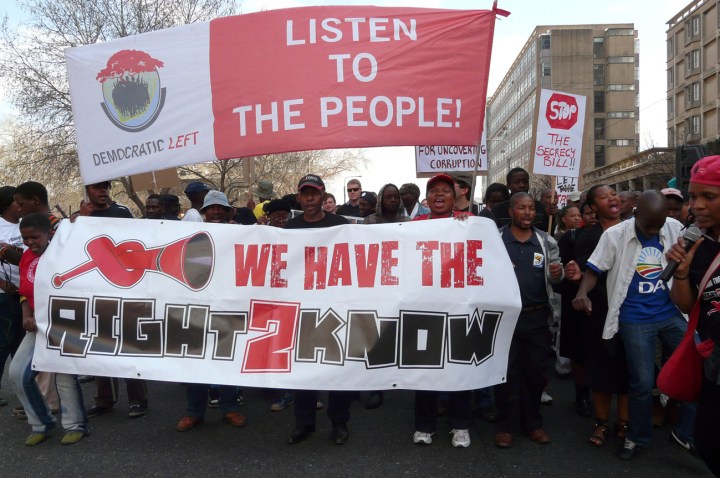The ANC recently promised that the Protection of State Information Bill would see further public consultation. As such, its re-tabling at the National Assembly as early as this Wednesday has come as something of a shock – particularly in light of Deputy President Kgalema Motlanthe's soothing address to the press last week about the possible inclusion of a public-interest defence. We don't trust Motlanthe on this one, and the fight for access to information will continue – all the way to the Constitutional Court if it comes to that. By THERESA MALLINSON.
In September the ANC decided to withdraw the controversial Protection of State Information Bill (Posib) from being debated in the National Assembly, on the grounds that more public consultation was required. This public consultation was to be conducted via party mechanisms, with the holding of ANC inter-parliamentary caucuses. These were closed to the media, but a press released issued by the office of the ANC chief whip, Mathole Motshekga, stated: “The provincial programmes for the public-engagement drive agreed upon at these preparatory meetings will be communicated via a wide range of communication platforms, including through local and national media. This will ensure that as many people as possible, regardless of their political allegiance, get an opportunity to have a say on the draft legislation before it is passed into law.”
That hasn’t happened, and last week the ANC announced that the bill would be debated in the National Assembly on Wednesday. Civil Society organisations, most prominently the Right2Know campaign, are, rather obviously, not happy with the situation. Right2Know national co-ordinator Murray Hunter told iMaverick: “At this point, we’ve had our frustrations with the government; right now our frustration is with the party (the ANC) itself.
“Essentially six weeks ago, the ANC announced that it would open the door to public consultation: it would be within the party, not the democratic institution of Parliament, (but we thought) ‘okay, we can deal with that’. We would like to make sure people are informed and can engage in any form of public consultation,” said Hunter. “(Now it’s) set to go back this week without any amendments. The chief whip’s office is saying that public consultation will continue to happen, subsequent to the bill going back to Parliament, which doesn’t make any sense.”
Mail & Guardian editor Nic Dawes also expressed his concerns about the bill been taken back to the National Assembly at this stage. “It’s certainly surprising, because the ANC said there was going to be a whole further consultation process outside Parliament, which clearly hasn’t happened,” he told iMaverick. “Frankly, I think many of us were ambivalent about that process because we… wanted more people’s voices to be heard about concerns with the bill, but it was awkward to take it outside the parliamentary process and into something that didn’t have necessarily the degree of rigour and openness that the parliamentary process has.”
Dawes said that the ANC’s original decision to withdraw the bill from the National Assembly was met with anxiety about the way this had been done, coupled with the feeling that more debate was welcome. Given the bill’s recent re-tabling, he said: “The anxiety side of that assessment has been vindicated to some degree.”
As Hunter explained, the National Assembly can either vote the bill through, or reconstitute the ad-hoc committee that was originally tasked with drafting it. What it can’t do, is push through any changes to the bill. “Essentially to take it to the National Assembly, before opening it for public consultation doesn’t make any sense,” Hunter reiterated. “This process has been shoddily handled – increasingly it speaks to the exact non-transparent thinking that the bill (embodies).”
Several of Right2Know’s crucial concerns with the bill have not yet been addressed. These include jail time for whistleblowers, the primacy of the bill over the Promotion of Access to Information Act, the lack of accountability of state-security agencies and the lack of an independent appeals mechanism. Dawes was also concerned with the flaws that remain in the bill. “I would broadly align myself – and I think Sanef (South African National Editors Forum) would as well – with the list of issued that R2K continues to raise,” he said.
Notwithstanding the disappointment and surprise expressed by opponents of the so-called secrecy bill, they are preparing for all eventualities. “First, we should look closely at what’s happening,” said Hunter. “No one seems to know what will happen in the next two week; the clearest idea I can get of what is going to happen is there will be a committee reconstituted to deal with very minor changes. It (the bill) will go to the National Council of Provinces to deal with probably quite minor changes, based on consultation that may happen within two weeks.”
If the bill is passed in its current form, Dawes said this would “certainly result in a legal challenge”. Both the Right2Know Campaign and Cosatu have previously stated their firm intention to take the legislation to the Constitutional Court, should Posib be passed. Dawes, however pointed out that: “There is still a final opportunity to use the parliamentary process to get it right, and that is in the National Council of Provinces, which is where the bill will go next.
“Quite often, we don’t pay much attention to what happens in the National Council of Provinces, because it isn’t always used to its maximum capability,” he said. “But if it is used properly to address the remaining issues with this bill then we can still get a good democratic instrument out of what has been a pretty torturous process, and we’ll welcome that warmly.”
As a final note, Hunter commented that: “There is a possibility, just based on what the deputy president has said in the last few days, that certain voices within ANC leadership are raising concerns about the current draft of the bill, and looking for opportunities to change the legislation they’re sitting with now.”
Hunter is, of course, referring to Deputy President Kgalema Motlanthe’s comments to the parliamentary press gallery last week where he stated that if, as understood by Sanef, it will be up to the courts to adjudicate whether a particular the public-interest defence holds up in specific cases, then this “creates the basis for a meeting point”. Motlanthe went on to tell the press gallery that: “We will not use numbers to ram through willy-nilly any piece of legislation that does not comply with the Constitution.”
We’d like to believe Motlanthe; trouble is, we’ve heard such reassurances before. In 2009, when he was president, Montlanthe sent the Film and Publications Amendment Bill back to Parliament for reconsideration without signing it into law. The statement issued by his office read: “The President has expressed reservation on the unconstitutionality of certain sections of the (bill) after careful consideration.” Critics of the bill were uneasy about the limits it placed on freedom of expression – for example, its inclusion of prepublication censorship – and Motlanthe was widely praised for his action. However, the bill was subsequently enacted in August that year (by which time current President Jacob Zuma had come to power), with no substantive changes to its original draft. Which means Motlanthe got to play freedom-of-expression hero, while ultimately the ruling party got to do exactly what it had intended to all along.
We suspect the same strategy is being employed now. The current deputy president has a remarkable way of managing to assuage the country’s fears about certain issues – only for those very same fears to be realised not-too-far down the line. In the case of Posib, Motlanthe’s pronouncements last week saw him playing his characteristic “good cop” role; with state security minister Siyabonga Cwele, among others, taking on the “bad cop” part.
We shouldn’t forget that the “good cop”, “bad cop” routine is designed to lull its subjects into a false sense of security. We’re not falling for it this time round. The ANC should take note that its apparent determination to push through the secrecy bill in its current form threatens not only freedom of expression and access to information in our country, but also tarnishes the image of the party itself.
As the latest Right2Know statement puts it: “It would appear as though the ANC is now conducting itself with the kind of secrecy that the bill itself threatens to institutionalise. As the R2K Campaign, we call on the ANC to come clean with the people of South Africa.
Otherwise, not only will the contents of the secrecy bill continue to invite sustained public opposition, but the entire legislative process followed to make it law will be brought into serious question.”
Earlier this month the Pretoria High court declared the aforementioned Films and Publications Amendment Act to be unconstitutional. That application was brought by Sanef and Print Media South Africa. When it comes to the Protection of State Information Bill, Constitutional Law expert Pierre de Vos is one among many voices who thinks that the bill “is probably (still) unconstitutional”.
Posib will land up at the Constitutional Court if is isn’t scrapped – or at the very least radically redrafted before then. And, no disrespect to Sanef and PMSA, but this time round organisations with a lot more heft – most notably Cosatu – will be bringing the challenge. If the ANC continues to insist on championing the bill, it better be prepared for one hell of a fallout. DM
The Right2Know campaign is staging a picket outside Luthuli House on Wednesday morning at 8am, and another protest outside Parliament on Wednesday afternoon from 1pm.




















 Become an Insider
Become an Insider